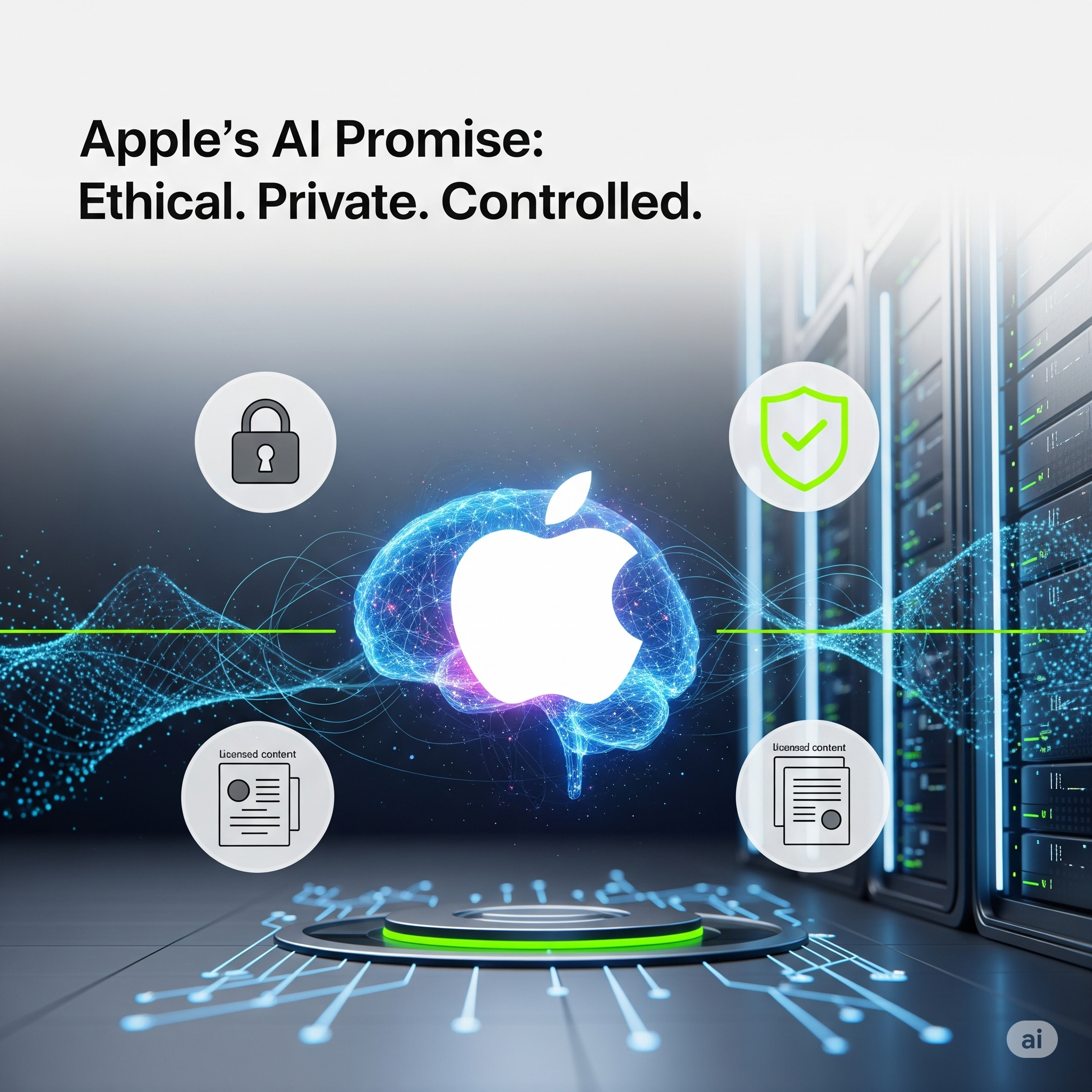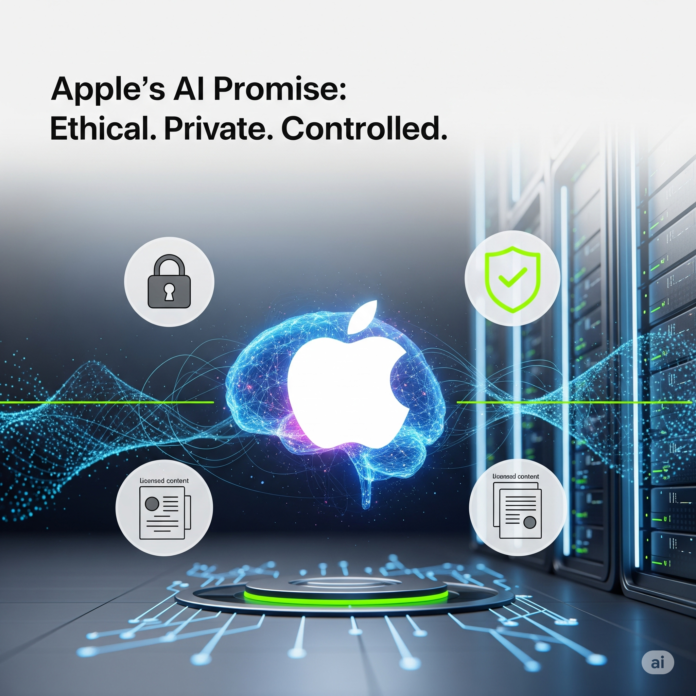
As the debate over how AI systems are trained heats up around the world, Apple has stepped into the spotlight, defending its approach and drawing a clear line between its methods and those of some of its biggest competitors.
In a statement released earlier this week, Apple reiterated that it is committed to training its AI models ethically, with particular emphasis on respecting the rights of content creators and news publishers. The company, often praised for its privacy-first philosophy, is making the case that it can build smart, useful AI without violating people’s trust—or publishers’ copyrights.
🤖 The Core of Apple’s Message: “We Don’t Just Take Content”
Apple says it is being very deliberate about the data it uses to train its AI systems. Unlike some AI companies that have come under fire for scraping large portions of the internet—sometimes including copyrighted material—Apple insists it only uses content that fits into three categories:
- Licensed content from publishers and content creators who have agreed to share their work
- Publicly available data from websites that allow AI crawling
- Synthetic or open datasets specifically designed for AI research and development
In simple terms, Apple is saying: “We don’t just scoop up everything on the internet and call it fair game.”
To help manage this, Apple uses its own crawler—called Applebot—which is similar to the tools used by Google or Bing to scan the web. But Apple has added a key feature to Applebot: publishers can now opt out of having their content used for AI training, without also being excluded from Apple’s search services. That’s a big shift from industry norms, where opting out of AI scraping often comes with trade-offs.
This opt-out tool, called Applebot-Extended, is meant to give publishers more control—and, according to Apple, it’s part of their promise to build “AI that’s helpful and fair, not harmful or extractive.”
📰 Talking to Publishers: Money on the Table
Apple’s public message comes on the heels of months of behind-the-scenes negotiations with major media companies. According to multiple reports, Apple has approached some of the world’s biggest publishers—including Condé Nast, NBC News, and The Wall Street Journal’s parent company, News Corp—with offers of multi-year licensing deals.
The reported amounts? $50 million or more per publisher.
That’s a hefty sum, especially compared to the deals offered by competitors—or worse, the lack of offers altogether. By offering actual compensation for content, Apple is trying to position itself as a company that doesn’t just preach ethics, but backs it up with action.
Still, not every publisher is jumping at the opportunity. Some are said to be cautious about the long-term implications of partnering with Apple on AI. There are open questions about how the content will be used, how attribution will work, and whether AI-generated summaries or responses might someday compete with the publishers themselves.
🔐 A Familiar Message: “Privacy First”
Alongside its respect for publishers, Apple is doubling down on a message it’s been sending for over a decade: user privacy is non-negotiable.
According to Apple, none of its AI models are trained on private user data. That means no messages, emails, or personal files are fed into its AI systems—even in anonymized form.
Instead, Apple leans on techniques like synthetic data, which simulates realistic human text, and differential privacy, a mathematical way to learn general trends from user behavior without ever exposing individual identities.
This approach isn’t just about following the law—it’s about earning trust. In Apple’s view, if users believe they’re being watched or mined for data, they’ll stop trusting the products. That trust, Apple argues, is the foundation of everything it builds.
📉 The Broader Context: Growing Pressure on Big Tech
Apple’s clarification comes at a time when public scrutiny around AI is growing louder. Several tech giants—like OpenAI, Meta, and Google—have faced lawsuits and backlash over the use of copyrighted material without permission in training their models.
For example:
- The New York Times is currently suing OpenAI and Microsoft over alleged copyright violations.
- Meta has drawn criticism for scraping user content across Instagram and Facebook.
- Google has acknowledged using vast public web datasets, including some that contain copyrighted work, for its AI efforts.
Compared to this landscape, Apple is trying to set itself apart—not by building the most aggressive AI, but by building the most responsible one.
But Apple hasn’t avoided criticism altogether. Earlier this year, a test rollout of AI-generated news alerts on iPhones in the UK caused controversy after the summaries included inaccurate and misleading claims. The feature was temporarily suspended, and Apple promised better oversight.
🔍 What Makes Apple’s Approach Unique?
Let’s break it down:
| Feature | Apple | OpenAI | Meta | |
|---|---|---|---|---|
| Publisher licensing | Yes, in progress with major publishers | Partial | Partial | Very limited |
| Opt-out controls | Yes, via Applebot-Extended | No clear system | robots.txt only | Unclear or ignored |
| Uses private user data for training? | No | Limited | Possibly | Unknown |
| Legal controversies | Few to none so far | Multiple lawsuits | Some disputes | High criticism |
| Training data focus | Licensed, open, synthetic | Web-scraped + licensed | Public web | Social media + web |
Apple hopes this comparison will highlight a core difference: They’re trying to do this the “right way”.
🔮 What Happens Next?
This isn’t the end of the conversation—it’s just the beginning. Apple is expected to expand its AI services across all its platforms, from iPhones to Macs to Siri. That means even more pressure to make sure its AI behaves reliably, respectfully, and accurately.
It’s also rumored that Apple may eventually integrate third-party models from companies like OpenAI or Anthropic into some of its cloud-based tools. If that happens, Apple’s challenge will be ensuring that outside tools still meet its internal standards for privacy and ethics.
At a time when generative AI is racing ahead faster than laws can keep up, Apple is clearly trying to carve out a different path. Whether that path will lead to better products—or just safer ones—remains to be seen.
In Apple’s words: “We believe AI should be trained with respect—for people, for content, and for the truth.”


